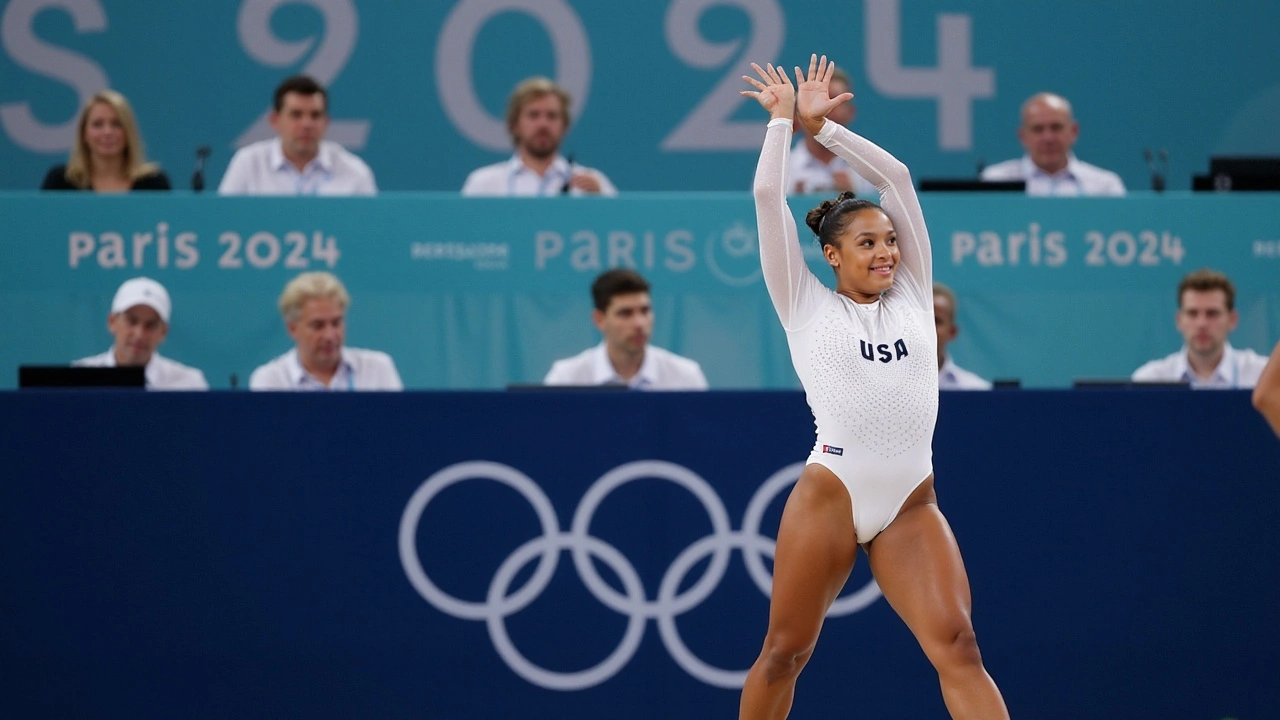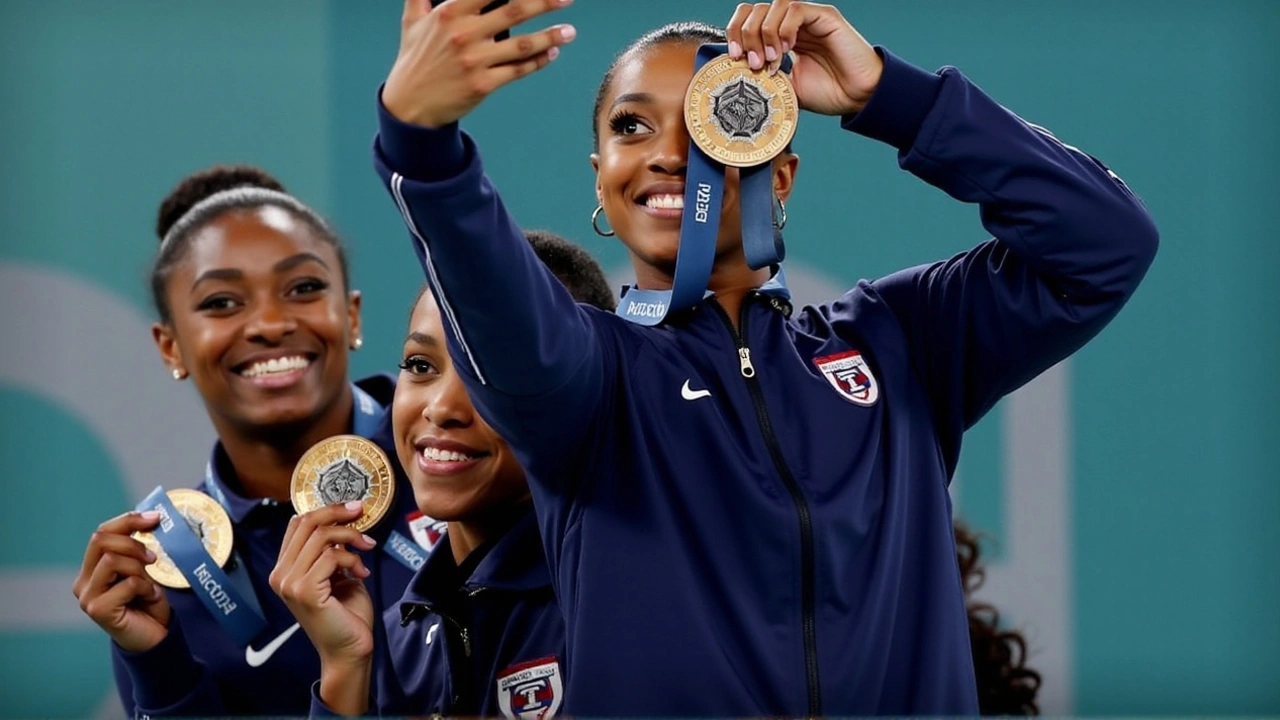Jordan Chiles Stripped of Medal Amid Scoring Dispute
In a dramatic turn of events at the Paris Olympics, American gymnast Jordan Chiles has been stripped of her bronze medal in the women's floor exercise. The gymnastics community was abuzz following a controversial scoring appeal, which originally landed Chiles the third-place spot on the podium. Her coach, Cecile Landi, had contested the initial score, and successfully so, pushing Chiles into the bronze medal position. However, this victory was short-lived as the Court of Arbitration for Sport (CAS) later intervened.
The issue arose when the CAS determined that the appeal by Chiles' team had been filed beyond the permissible one-minute timeframe established by the International Gymnastics Federation (FIG). This regulation is strictly enforced to ensure fairness and order during competitions. Unfortunately, the late submission meant that Chiles' revised score was deemed invalid. Consequently, the bronze medal was reallocated to Romanian gymnast Ana Barbosu, who originally finished in fourth place.
The International Olympic Committee (IOC) confirmed they would adhere to the ruling by the FIG and CAS. Arrangements would be made for Chiles to return her medal. This decision, while legally sound, has emotional and psychological implications for the athletes involved. For Chiles, it was a particularly painful experience. The young gymnast faced a barrage of abuse on social media, including racist attacks, which led to her decision to temporarily step back from her online platforms.
Impact on Jordan Chiles
Jordan Chiles, known for her determination and athletic prowess, has faced numerous challenges in her career. The loss of her Olympic medal is a significant setback and highlights the often harsh realities athletes face. The mental and emotional strain can be immense, particularly in an era where social media comments can amplify negativity. The support from coaches, family, and the broader gymnastics community is crucial in such times, as athletes navigate the highs and lows of their sports careers.
The U.S. Olympic officials have announced their plans to appeal the ruling by CAS. They believe that the circumstances surrounding the late appeal should be reconsidered, given the stressful environment in which the decisions were made. Appeals in such high-stakes situations are not uncommon, and the U.S. team is hopeful for a favorable resolution.

Scoring Disputes in Olympic History
This incident is far from unique in the annals of Olympic history. Over the years, various athletes have had their medals rescinded due to different disputes, ranging from scoring inconsistencies to positive drug tests. The strict adherence to rules and regulations is meant to uphold the integrity of the Games, yet it can sometimes lead to contentious and emotionally charged outcomes.
For example, in gymnastics alone, the 2004 Athens Olympics witnessed South Korean gymnast Yang Tae-Young losing his bronze medal due to a scoring error. Similar controversies have emerged in other sports, underscoring the pressure on judges and officials to get everything right in real-time. The rigorous processes for appeals and the subsequent rulings by bodies like CAS are designed to bring clarity and fairness, though they aren't always welcomed by the affected athletes.
The Role of the Court of Arbitration for Sport (CAS)
The CAS, an independent institution, plays a pivotal role in resolving disputes in the Olympic arena. They ensure that rules are followed meticulously and that fairness is maintained. However, their decisions can be polarizing. The Chiles case is a testament to their influence and the rigor of their procedures. CAS rulings are considered final, leaving limited room for overturning their decisions, adding pressure on all parties involved to present their cases effectively and promptly.
As the U.S. team prepares for their appeal, they will likely emphasize the extenuating circumstances under which the appeal was filed. Stress, rapid decision-making, and the high stakes of Olympic competition all contribute to the complexity of such situations. Whether their efforts will result in a different outcome remains to be seen.

The Emotional Toll on Athletes
The emotional well-being of athletes like Jordan Chiles cannot be overstated. The combination of intense training, competition pressure, and public scrutiny creates a unique set of challenges. It's essential for athletic organizations and governing bodies to provide robust support systems for their athletes, helping them navigate both successes and setbacks.
Chiles' experience also highlights the darker side of social media, where athletes are often targets for abuse and criticism. The decision to take a step back from online activity can be a healthy one, allowing athletes to focus on their mental health and personal well-being.
Looking Ahead
As this story unfolds, the broader gymnastics community will be watching closely. The outcome of the U.S. team's appeal could have implications for future Olympic rules and the handling of similar disputes. For now, Jordan Chiles and her supporters remain hopeful for a resolution that acknowledges the effort and skill that brought her to the Olympic stage in the first place.
This incident serves as a reminder of the incredible discipline and resilience required to compete at the highest levels of sport. Regardless of the final outcome, Jordan Chiles' journey remains an inspiring testament to her strength and dedication as an athlete.
The gymnastics world continues to support her, recognizing that medals, though significant, are only part of the broader narrative of an athlete's career. For Chiles, this chapter might be marked by controversy, but it also reinforces her status as a competitor of remarkable talent and tenacity.


Rachael Blandin de Chalain
August 16, 2024 AT 20:19While the technicality of the appeal deadline is clear under FIG regulations, the emotional cost to the athlete is not accounted for in any rulebook. This is not merely a procedural error-it’s a human tragedy unfolding in real time under global scrutiny. The system prioritizes precision over compassion, and that’s a flaw in the architecture of sport itself.
Soumya Dave
August 17, 2024 AT 06:52Let me tell you something-Jordan Chiles didn’t just train for years, she sacrificed sleep, friendships, weekends, and her peace of mind for this moment. And now? A clock ticks, a form is filed one second too late, and everything is ripped away? That’s not justice-that’s bureaucracy with a podium. The fact that she’s being harassed online on top of this? It’s beyond disgraceful. The gymnastics world needs to stand up-not just with words, but with action. We owe her more than a medal. We owe her dignity.
Chris Schill
August 17, 2024 AT 07:24The appeal window is one minute. That’s the rule. CAS followed it. No exceptions. That’s what makes the system fair-even when it hurts. If you allow exceptions for emotional distress, you open the door for every team in every sport to claim ‘stress’ as a reason to bypass procedure. That’s how you destroy integrity. The system isn’t perfect, but it’s consistent. And consistency is the only thing keeping Olympic competition from descending into chaos.
cimberleigh pheasey
August 18, 2024 AT 03:39Okay but can we just take a second to acknowledge how cruel social media is right now? This girl gave everything, got a medal, then had it yanked away-and then got bombarded with racist trash? No. Just no. We need to stop pretending this is ‘just sports.’ It’s a person. A 21-year-old woman who probably cried herself to sleep last night. Let’s be better. Let’s support her. Let’s demand better from our systems and our culture. She didn’t lose because she wasn’t good enough. She lost because the machine didn’t care enough to bend for her humanity.
Tom Gin
August 18, 2024 AT 20:07So let me get this straight: a gymnast does a flawless routine, gets a score that puts her on the podium, the coach appeals, it WORKS, and then some suit in a fancy office says ‘oops, you were 3 seconds late’ and takes it back? And the whole world watches? This isn’t sports. This is a Netflix drama written by someone who hates joy. I’m starting a petition to rename CAS: ‘Court of Arbitrary Sadness.’
Alex Alevy
August 19, 2024 AT 17:25For context: the one-minute appeal window exists because gymnastics scores are reviewed live, and delays would stall the entire event. But here’s the thing-this wasn’t a simple score correction. The original score had a clear error in execution deductions. The team was scrambling under pressure, and the appeal was submitted within the *actual* time they had to react. The system didn’t account for human reaction time under Olympic stress. That’s the real issue. The rule is fine. The application? Needs nuance.
Aileen Amor
August 20, 2024 AT 15:51THIS IS UNACCEPTABLE!!! Jordan Chiles worked HARDER than anyone else in that gym!!! She didn’t deserve this!!! The system is BROKEN!!! Why does bureaucracy always win over heart??? I’m so angry right now!!! This is why athletes quit!!! This is why kids stop doing sports!!! Someone needs to DO SOMETHING!!!
Danica Tamura
August 20, 2024 AT 19:07Wow. What a surprise. The U.S. team appeals again. Again. Again. Always the drama queens. The rules are the rules. If you can’t file on time, you lose. End of story. And yes, she got abused online-that’s what happens when you’re famous. Deal with it. Stop crying about medals. Real athletes don’t need a piece of metal to prove they’re great. They just go out and do it again. Next.